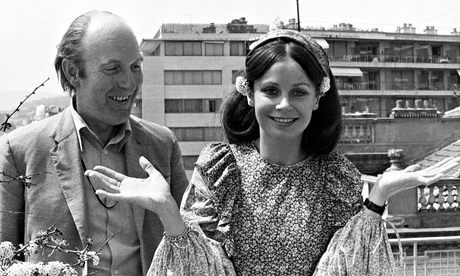
Alan Bridges, who has died aged 86, was a leading director during the glory days of the BBC, from the mid-60s to the early 70s. Today, whenever media pundits analyse the history of television drama, they wax lyrical about The Wednesday Play and its successor Play for Today, bemoaning the virtual disappearance of the single play.
By the time Bridges started working in the Wednesday Play slot, he was already one of the BBC's most experienced TV directors – he had directed excellent 10-part adaptations of two 19th-century classics, Great Expectations and Les Misérables (both in 1967) – but he relished the "right to fail" ethos at the BBC, enjoying working with exciting contemporary writers.
While continuing to have a distinguished television career into the 80s, adeptly moving from the popular to the experimental, from the modern to the classical, and from the underground to the drawing room, Bridges found time to direct eight feature films.
One of them, The Hireling (1973), won the coveted Palme d'Or in Cannes (sharing it with Jerry Schatzberg's Scarecrow). The Hireling was the first and best of Bridges' films dealing with the repressive nature of class and the conflict between sexual desire and social conventions. There is no cinema in the world more class-conscious than Britain's, and most of Bridges' movies are in that long tradition.
Bridges, who was born in Liverpool, first wanted to be an actor, and studied at Rada in London. But after a few years in rep, he decided that he would rather direct. In 1961, he produced and directed a six-episode crime series, You Can't Win, for the BBC. He went on to direct realistic single plays in the series First Night (1963-64), a forerunner of The Wednesday Play, as well as an episode each of Z-Cars and Maigret (both 1963).
In his first feature, Act of Murder (1964), a programme filler made for the Edgar Wallace Mystery Theatre series, Bridges managed to squeeze a great deal of tension out of a love triangle between an actor, his mistress and her husband, all in 62 minutes. It was shot cheaply at the tiny Merton Park studios in south-west London, as was Invasion (1966), an unusual, small-scale science-fiction film in which a sleepy English village is visited by aliens.
Bridges returned to "serious" television work with The Wednesday Play and Play for Today, which included four plays by David Mercer and two by Dennis Potter. Looking back on Mercer's plays, Ian Penman, in the Sunday Correspondent, recalled "monochrome anger, intense beards, polo-neck politics". This was well represented by Let's Murder Vivaldi (1968) and Mercer's remarkable trilogy, On the Eve of Publication (1968), The Cellar and the Almond Tree (1970) and Emma's Time (1970), focusing on an ageing socialist writer, for which Bridges juxtaposed cuts between past and present, fantasy and flashbacks.
The Potter plays, Traitor (1971), a spy drama, which gave John Le Mesurier a rare dramatic leading role, and Joe's Ark (1974), a religious allegory, added to Bridges' prestige. The Lie (1970) was based on half a play by Ingmar Bergman, one of Bridges' heroes. "We had to improvise dialogue at times, but his direction in what he wrote was amazing," said Bridges. "But then, I'm a northerner, half-Scottish, and we're a bit bleak." This also explains his attraction to Ibsen - he directed a production of Ghosts for the Royal Shakespeare Company at the Aldwych in 1967, with Peggy Ashcroft as Mrs Alving, and The Wild Duck (1971) for BBC's Play of the Month.
His impressive TV work led inevitably to bigger-budget features such as The Hireling. Based on a novel by LP Hartley, it skilfully explores the social unease and sexual tensions between an aristocratic widow (Sarah Miles), recovering from a nervous breakdown, and her chauffeur (Robert Shaw), beneath the elegant period detail of England in the 1920s.
Out of Season (1975) pursued the passions behind controlled contentment in a sexual power game played by an American (Cliff Robertson), a middle-aged Englishwoman (Vanessa Redgrave) and her teenage daughter (Susan George) in a wintry English seaside resort. Age of Innocence (1977), shot and set in Canada, told of an English teacher (David Warner), whose pacifist leanings disturb the narrow-minded postwar community. Again dealing with the conflict between desire and social convention, The Return of the Soldier (1982) focused on an amnesiac first world war veteran (Alan Bates), his cold, middle-class wife (Julie Christie), his cousin (Ann-Margret) and his working-class old flame (Glenda Jackson).
The Shooting Party (1985) was a languorous, melancholy valediction to the Edwardian era with a built-in critique of the class system, although the only feathers that are ruffled are those of the birds that are gunned down. The shooting of game, of course, foreshadows the first world war. It was Bridges' last movie. In 1987, a production of Apt Pupil, based on the Stephen King novel, was shut down after 10 weeks of shooting, owing to lack of funds.
Bridges' wife, Ann, died in 2011. He is survived by a son and daughter.
• Alan Bridges, film and television director, born 28 September 1927; died 7 December 2013
• This article was amended on 7 February 2014. The original stated that Alan Bridges' wife Ann survived him

